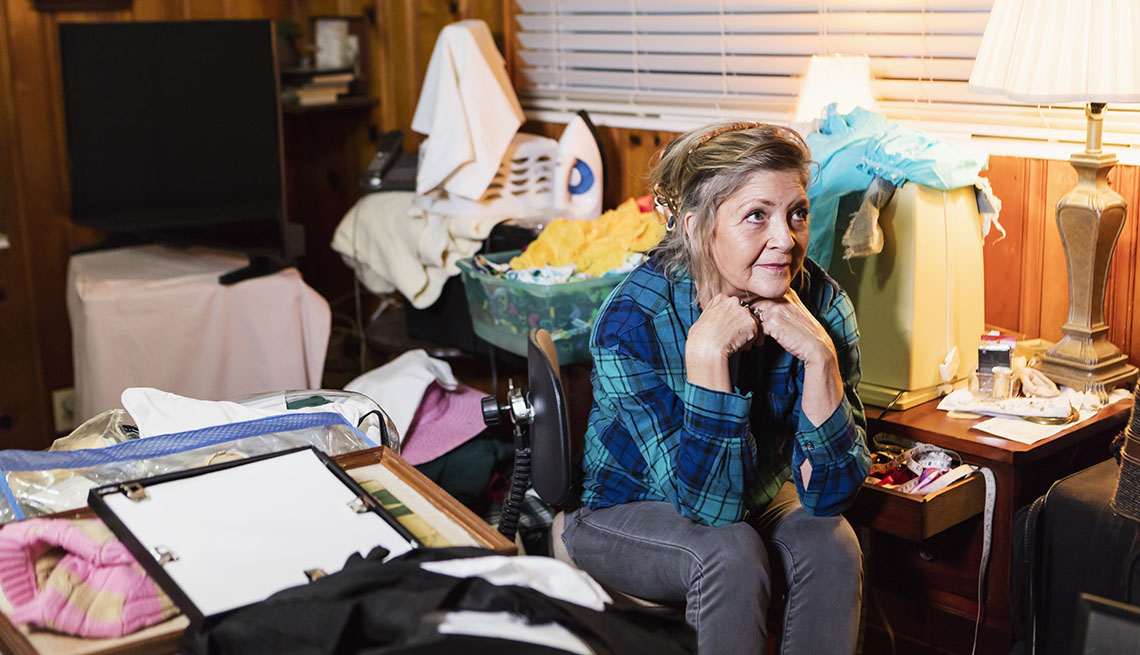Decluttering For Seniors

Spring is here, and that makes many folks think of “spring cleaning.” With this tradition in mind, we decided to tackle a topic faced by many of our clients: Decluttering for Seniors. If you are concerned about the clutter in an elderly loved one’s home – or maybe even your own – read on to learn more about this challenge and how to help from some experts in the field of decluttering for Seniors.
Why do older adults tend to have a lot of “stuff”?
For one thing, they have had more time to accumulate items, according to AARP. Lisa Joy Rosing, downsizing consultant with Joy of Downsizing, points to the challenges with maintaining a household as we age. Seniors are likely to experience things like “loneliness, isolation, boredom, death of a spouse, hospitalization, injury or rehab… [and] cognitive changes” that can limit their ability to manage their home and items.
And among the items that we have, more of them take on sentimental value as we age. “It’s tough to have so many changes over the years,” says Lauren Beghou, owner of Neat Freaks Home Organizing and Design. As time passes and we continue to associate memories with specific objects, explains Beghou, “letting go of these items can be tough.” “I always say that emotional and mental clutter is often more significant than physical clutter,” agrees Brooke Milton, professional organizer with Design. By the Duchess of Declutter. “A vase or pocket watch may have a memory attached to it,” and separating the emotion from the object can be difficult.
Understandably, these factors can make it hard for a Senior to pare down and organize their belongings. But the benefits of doing so are enormous. According to research by Utah State University, decluttering and organizing our physical space improves concentration and focus, two things with which older adults may struggle. Decluttering also improves our mood and reduces stress, which is crucial for overall health and well-being. And reducing one’s falls risk and ensuring a space is optimized for caregiving support are also important considerations for most Seniors. Rosing agrees, and shared that she educates Seniors on the safety risks of not decluttering.
How can loved ones help Seniors with the decluttering process?
Patience and emotional support are paramount. As Beghou says, “it’s often not the desired Saturday afternoon activity,” and family members demonstrating that they “understand the emotional element of decluttering” is really important. Milton agrees that “taking the emotion out of the equation is key.” Continues Milton, family members can help by highlighting the memory associated with an object rather than the physical object itself. Supporting such memory-keeping is a tangible way that loved ones can help Seniors with the emotional aspect of the decluttering process. Beghou recommends preserving memories in journals or voice recordings, rather than with physical objects. Rosing encourages her clients to take photos of sentimental items with which they are parting.
But tackling a decluttering project may not be something that family members are able or willing to do. Thankfully, professional services are available to help Seniors with decluttering. The National Association of Productivity and Organizing Professionals website can help you locate an organizing professional in your loved one’s area who specializes in working with Seniors. And professionals with the National Association of Senior & Speciality Move Managers are particularly important for the right-sizing process when your Senior is moving. Having a professional involved is particularly beneficial for supporting the emotional piece of decluttering for Seniors, shares Rosing. “[We] can come in to meet with the Senior without judgment, shame, or family dynamics.” Milton also explains how it’s unrealistic to expect Seniors to know where to start with decluttering. “They have analysis paralysis, so it becomes easier to procrastinate.” Professionals help “break the process down into more manageable projects.”
Milton echoes this sentiment in how she works with her clients. She encourages clients to “do something every day, even if it’s for 10 minutes. A drawer, a cabinet, a pile, a box. It’s important to take breaks and edit in small chunks of time.” Beghou helps her clients create categories of items as a way of breaking down a larger task into more manageable pieces. Shares Rosing, “I try to help my clients differentiate what is a true treasure they can not replace and an item they love, but can live without.”
At the end of the day, decluttering for Seniors is about finding the balance between needing and wanting, says Milton. And one last thing, advises Rosing: The dust! “Oftentimes when there is clutter there is dust, [and] I…refer my senior clients to professional cleaners to remove dust and clean the home regularly.”
Thank you so much to Lauren Beghou, Brooke Milton, and Lisa Joy Rosing for their thoughtful contributions to this post.



